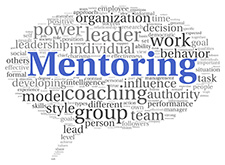So, you have a mentor. Whether they’re a personal, business, or school mentor, you’re lucky to now be in a relationship that can help you grow and succeed in your professional and personal life. Like all relationships, both sides have responsibilities. It’s important to remember that the mentor doesn’t do all the work – you have to put in your own level of effort and time too. Your mentor takes an active role in guiding and helping you, but you also have to let them know about what you want to learn, your challenges, your hopes, and more. What To Expect From Your Mentor Let’s talk about what a mentor actually does. A mentor will: Offer encouragement and ongoing support Listen to things that are worrying you and give constructive, unbiased support Share stories and examples of their own failures and victories Provide honest feedback and suggestions Act as a sounding board for ideas and dreams Help with making decisions by offering alternative views based on experience Introduce you to …
 Did you ever have a teacher or a friend who – no matter what happened – believed in you and wanted you to succeed?
Did you ever have a teacher or a friend who – no matter what happened – believed in you and wanted you to succeed?
Did that person give you advice, encouragement, and guidance? Did you look up to that person and become better thanks to the attention they gave you?
If so, you are probably one of many people who had a mentor!
Mentors are invaluable, and many people have had one at some time in their life. The best part is that you’re never too young to be a mentor. High school students, middle-school students, college-aged youth, and young professionals can be a mentor to someone else.
What is a Mentor?
A mentor is usually someone older than the person being mentored, who takes a personal interest in the success and well-being of another. They not only share knowledge, skills, and experience, but also discuss new ideas and help the mentee work out solutions on their own and with guidance.
A mentor challenges, protects, offers support, shows patience, and is enthusiastic about helping their mentee grow and be successful.
While those qualities may seem a bit overwhelming, it’s important to know that anybody can be a mentor, no matter what the age. Even students still in high school can start mentoring by reaching out to someone younger. The mentor should ask questions about what is important to the mentee, and above all, should be a cheerleader for that person by boosting their confidence and leading them to success.
What Does a Mentor Do?
Some examples of what a mentor does include:
- Provides the same type of help that you do in everyday life. If you naturally “help others,” you can use those same practices in a mentorship role.
- Provides information and advice based on your own ideas, successes, and experience.
- Encourages others to take positive risks and have a positive and healthy outlook.
- Offers honest and constructive feedback.
- Helps with planning or thinking through a problem or challenge.
- Listens to the concerns, points of view, and dreams of the mentee.
- Shares different views and ways of thinking.
- Introduces that person to others who can help and advocate on their behalf.
Why Be a Mentor?
Being a mentor doesn’t just help the mentee. It is also a chance to look at yourself more closely and explore your own opportunities.
You have the chance to become more successful and confident as you instill those qualities in another person. You’ll also become more open to reaching out to your own mentors who can help you succeed in school, college, or your career.
By mentoring, you improve your personal and professional responsibilities as you learn, grow and become more accountable to others. As you model the professional and personal values that others admire, you will teach them how to live up to those values.
In terms of leadership, you can’t go wrong with becoming a mentor. Talk to your school’s counselor or company’s HR department about how to become a mentor. It’s a move that can help you – and someone else – succeed!
Have you ever been a mentor? Did you have someone special who helped you? Share your stories in the comments section below.
Movin’ On Up is brought to you by Express Employment Professionals.
 The concept of having a mentor to help you in your career and professional growth is nothing new. In fact, it’s common to hear of everyone from doctors and lawyers to teachers and entrepreneurs having a mentor. But, the mentorships of today may look different from what you anticipated or remembered.
The concept of having a mentor to help you in your career and professional growth is nothing new. In fact, it’s common to hear of everyone from doctors and lawyers to teachers and entrepreneurs having a mentor. But, the mentorships of today may look different from what you anticipated or remembered.
A Huffington Post article defines mentoring as a “partnership where a ‘mentee’ is assigned to a more experienced ‘mentor’, who passes on valuable aspects of their own accumulated experience and wisdom for the benefit of the mentee’s personal and professional development.” However, as the same article explains, mentoring has evolved and often both individuals play the roles of mentor and mentee. For instance, now “mentors gain an understanding of the world view of another generation and equally, mentees can help senior colleagues to see new perspectives and shifts in societal behavior, for instance, the growing importance of social networks.”
So if you’re on a quest to find the right mentor, you need to sit up and pay attention. This shake-up in the roles and expectations associated with mentoring affects what you should look for in a mentor. Not only do you need to consider if someone will be a good mentor in the traditional sense, you also need to contemplate if the person will be a good “student.” To help you sift through your options, here are five traits that set a great mentor apart.
Listener
A mentoring relationship is based on communication, and the most important aspect of communication is listening. You want a mentor who understands the difference between hearing and listening – someone who strives to understand what you’re trying to say. This is crucial when you’re trying to describe a situation in order to get their input, as well as when you’re trying to explain a new concept, such as social media.
Young At Heart
There are some people who have always been old at heart, while there are others who will always be young at heart. When you’re looking for a mentor, find someone who is the latter. Certainly, if you’re helping your mentor understand the differences in work culture or between the generations, it will make your job easier. But, it will also help mentors relate to you and give better advice if they remember what it was like to be young.
Courageous
It takes a courageous person to open up and be honest at the level required for a truly successful mentorship. But even beyond that, you need to find a mentor who has had some major career failures and yet still had the courage to keep trying. The more mistakes someone has bounced back from, the more experience they’ll have to share and the more helpful they’ll be as a mentor. Plus, this will be the kind of mentor who isn’t afraid to ask questions and learn new things from you.
Teachable
If you want to get the most out of a mentoring relationship – with both of you giving and taking – you want a mentor who is teachable. While a know-it-all advisor might be helpful for a while, you’ll soon get tired of the attitude and start wishing for someone more open minded. This is something you really want to pinpoint because it ultimately goes back to expectations. Does your mentor just want to give you advice and tell you what to do? Or does your mentor want a reciprocal relationship so he or she can learn new things from you too?
Curious
Inquisitive people are generally successful people, which is exactly what you want in a mentor. You need someone who is curious about your life and wants to know how to help. A naturally curious person will encourage your own curiosity and push you to never stop learning. That need-to-know drive will also ensure the mentorship is a two-way relationship, with your mentor learning from you as well.
Mentoring is no longer the one-way street it once was. An article from Forbes echoes the same sentiment and explains that, “Effective mentorship relationships enrich both people.” So make sure you keep that in mind as you seek out a mentor. A great mentor will also make a great mentee.
Do you have a trusted mentor you go to for advice? What do you find valuable about that relationship? Share with us in the comments section below!
Movin’ On Up is brought to you by Express Employment Professionals.
